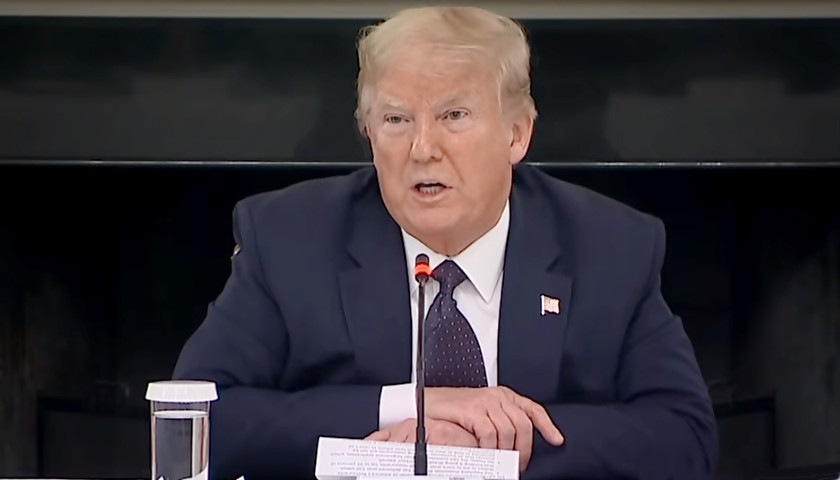by Debra Heine
President Donald Trump casually let slip Monday afternoon that he’s been taking hydroxychloroquine, the anti-malarial drug he’s touted as a promising treatment for Covid-19 patients that has become a lightning rod for controversy.
“A couple of weeks ago, I started taking it,” Trump told reporters during a roundtable at the White House with restaurant executives and industry leaders.
“I was just waiting to see your eyes light up when I said this,” Trump added.
The stunning announcement came after the president blasted two “fake whistleblowers” who have dogged his presidency in the past year, Ukraine “whistleblower” Eric Ciaramella and Dr. Rick Bright, a high-ranking government scientist who is accusing the Trump administration of prioritizing politics over science.
Bright was demoted at the Department of Health and Human Services (HHS) after he refused a White House directive to “drop everything and make hydroxychloroquine widely available to the American public.”
During an interview on CBS’s 60 Minutes, Sunday night, the doctor said he never believed that hydroxychloroquine would be “a game changer” and said the drug could in fact be dangerous. “It could have negative side effects. And it could even lead to death,” he told CBS reporter Norah O’Donnell.
When asked if he thought the Trump administration retaliated against him, Bright replied that he did.
“I believe my last ditch effort to protect Americans from that drug was the final straw that they used and believed was essential to push me out,” he said.
Trump called Bright a “fake whistleblower” and suggested that he’s a big Democrat donor. He encouraged reporters to investigate any potential conflicts of interest.
“See whether or not he’s been a big contributor to the Democrats,” Trump said. “See whether or not he wanted the Democrats to win.”
The president also pointed out that Bright signed an application to make the controversial drug available—so if he thought it was so dangerous, why would he do that?
“A lot of bad stuff coming out about him,” Trump declared.
The president argued that “a lot of good stuff has come out about the hydroxy,” and that front line doctors and nurses are using it.
“The front line workers, many, many are taking it,” Trump said, adding, “I happen to be taking it.”
He said that he started taking the medication about a week and a half ago because he thinks it’s a good preventative measure. “I’m still here,” he cracked.
“I’ve heard good stories,” he said. “And if it’s not good, I’ll tell you right? But I’m not going to get hurt by it. It’s been around for 40 years for malaria, for lupus, for other things.”
The president told reporters that he’d received “many” letters from doctors expressing confidence in the drug, including a doctor from Westchester, New York who claimed he’d given the hydroxychloroquine, azithromycin and zinc cocktail to “over 300 patients” and hadn’t lost a single one.
Trump dismissed a study by the Department of Veterans Affairs that found no benefit and more deaths among COVID-19 patients taking the drug.
“If you look at that phony report that put out … the hydroxy was given to people who were in extraordinarily bad condition … people that were dying.”
Trump said that he’d consulted with his presidential physician about the drug and the doctor said he could take it if he wanted to.
Two White House employees were recently diagnosed with COVID-19 in recent days, Trump’s personal valet and Vice President Mike Pence’s top spokesperson.
Trump told reporters that he had nothing to gain from touting the drug. “I just want the people of this nation to feel good,” he said.
Following his announcement, many media outlets and reporters, including Fox News’ Neil Cavuto , stressed in their reports that the president was taking an unproven and potentially dangerous drug.
Cavuto warned that people in certain risky populations “will die” if they take the drug.
“It will kill you,” he said. “I cannot stress this enough. This. will. kill. you.”
Investigative reporter Sharyl Attiksson did a deep dive into the hydroxychloroquine controversy and found that money and politics were behind much of the opposition to the drug.
Her full report, which aired Sunday, can be viewed at Full Measure.
– – –
Debra Heine is a reporter at American Greatness.




